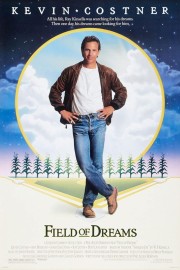Field of Dreams
One of my favorite memories I have with my father was in 1992. We went to Game 7 of the National League Championship, where Sid Bream slid in to home, sending the Atlanta Braves to the World Series for the second straight year. By that point, it was clear that I would not be an athlete, and had gone a different route, but my father and I were close at that time, in large part because of Boy Scouts. As the years went on, though, and I pursued creative endeavors, we drifted apart. My dreams outweighed his own grounded hopes for me. We were never that close again.
“Field of Dreams” is about something in the universe that tells you, “Something is missing in your life. Accomplish this, and you’ll find it.” For Ray Kinsella (Kevin Costner), that something is reconciliation with his father. Baseball is the way into that emotional need. The idea of building a baseball field in the middle of an Iowa cornfield is certifiably insane before you consider that Ray is doing so because a voice told him to. But like Richard Dreyfuss’s character in “Close Encounters of the Third Kind,” that voice taps into a void in Ray’s life that only pursuing this one, insane idea can fill. Coming to this film as an adult, someone who’s reconciled his own relationship with his father, runs the risk of not having it connect with you. But Phil Alden Robinson’s film is universal, and regardless of what type of relationship you had with your father, it has the power to move.
If I had truly seen this movie when I was younger- I know I saw parts of it, at least- I don’t know if I would have appreciated James Horner’s score the way I do now, coming to it almost seven years after his death when I watched this last year as part of my podcast on baseball movies. But something Horner did so beautifully was delicate emotions, whether it was how he scored the drawing scene in “Titanic,” the funeral scenes in “Braveheart,” or the emotions at the heart of “Field of Dreams.” This film traffics in magical realism, as Ray makes the baseball field on his Iowa farm, and suddenly is met with baseball legends like Shoeless Joe Jackson (Ray Liotta), and the story allows Horner to re-contextualize some of his favorite “go to” musical voices like the pan flute and synthesizers to ground that magical realism is haunting, lovely emotions. This is a film about following your heart, and doing what you feel like life is pulling you to do, and Horner’s score captures that in a way that only he really could. This would have been a very different movie with another composer, and not necessarily a better one.
It’s hard to say that baseball is necessarily “America’s Pastime” now, as the NFL and NBA have seemingly surpassed it in popularity and profit, but even going to see a game now, one feels the romanticism of the sport, and the suspense of a game where the contest is a marathon more than a sprint. “Field of Dreams” connects with that romanticism better than any baseball movie before or after it, whether it’s when we watch the past greats come out of the cornfield to play on Ray’s field, or his interactions with author Terrence Mann (James Earl Jones) and Doc “Moonlight” Graham (Burt Lancaster), there’s something about baseball that brings out a love of the game that, honestly, just isn’t there with other sports. That’s why my memories of going to games with my dad focus on baseball more than other sports; this sport just hits differently when shared with someone you love. “Field of Dreams,” I would imagine, is the same way.
When you watch a film like this when you’re older, it resonates more, I think, because at 45, I feel very akin to Ray in this film, sometimes taking big swings in life, but also feeling as though I’m stuck in the life my father wouldn’t have necessarily wanted for me. The thing that’s interesting, though, is that I ultimately love the life I have, and Ray does to, but taking that big swing in building the baseball field doesn’t mean his wife and daughter are not enough for him; it just means that the universe realizes there’s something else nagging at him, and he needs this challenge in front of him to push him forward to whatever life has in store for him next. When you realize that purpose, it’s what makes you whole. Ray accomplishes that for everyone in “Field of Dreams,” especially himself.










